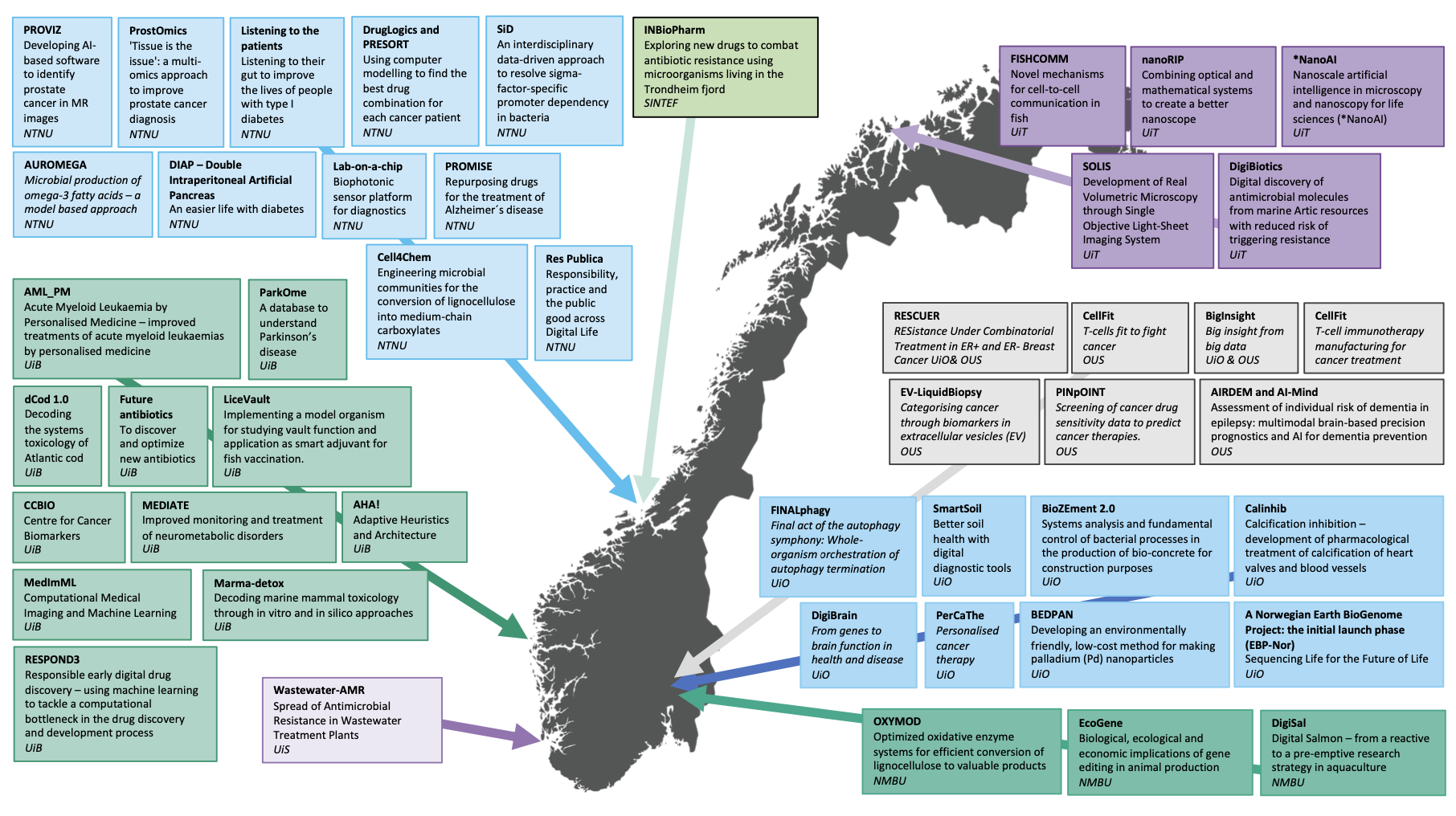Meeting the rapid developments in biotechnology by fostering transdisciplinarity, including digitalisation and big data, to create convergence for innovation in a virtual centre
The Centre for Digital Life Norway (DLN) is a strategic national initiative originally conceived in 2014 by the BIOTEK2021 programme of the Research Council of Norway (RCN). It is an ambitious and large-scale initiative to foster and boost transdisciplinary biotechnology research and innovation activities, combined with a novel framework of responsible research and innovation, to solve challenges of societal importance and create value.
DLN departs from the traditional organisation of research and development among Norwegian research institutions. The centre aims to untangle and resolve some of the fundamental societal challenges facing new and emerging biotechnology by emphasising technological convergence and transdisciplinarity.

The centre’s work
The virtual centre consists of multiple interdisciplinary research projects (Fig. 1) collected under an umbrella competence hub with the responsibility to promote national collaboration both at the institutional and researcher levels. Within the disciplines of chemistry, microbiology/bacteriology, and molecular medicine, these projects cover digital methodologies to combat disease and conditions, including microbial and antibiotic resistance, neurometabolic disorders, dementia, epilepsy, Alzheimer’s, Parkinson’s disease, heart disease, diabetes, and cancer.
In addition, biotechnology, the production of nanoparticles, omega-3 fatty acids, new antibiotics, aquaculture, marine biology, and nutrition are also included. A common feature of the projects is technological approaches, such as the use of machine learning and AI generation, storage of high-throughput, high-dimensional molecular data, use of digital microscopy, and nanotechnology.
The extensive generation of data requires close dialogue and collaboration of the centre´s research projects with ELIXIR Norway, the 1
million genome project, and other related EU initiatives, further strengthening the national capacity for data handling, interpretation, management, and sharing. Solutions for improved data management in the centre include using the Norwegian e-Infrastructure for Life Sciences (NeLS) and the FAIRdom SEEK data management platforms. These platforms provide access to long-term storage of scientific data, simplify good practices for documenting metadata, and make it easier to share and publish data and models. These solutions facilitate the FAIRification (Findable Accessible Interoperable Reusable) principles of scientific results as the norm for biotechnology projects.
With all major Universities and institutions in the country as founding members, partner organisations, and close collaboration with the Research Council of Norway and policy advising bodies, DLN has become a nationally visible centre that leverages synergies between existing biotechnology capabilities of the Norwegian research landscape. A second phase of the project started in 2021 (DLN2.0) and enabled the creation of an even stronger knowledge and competence hub, catalysing research and innovation for the future. The centre is governed by an operational management team (OMT), assisted by a task force expert panel. The involvement of young researchers comes through the ‘junior resource group’.
Different activities are coordinated by the OMT, such as seminars in Responsible Research and Innovation (RRI), Open Science and Data Management, the ambitious Innovation RoadMap project for innovation among the project portfolio, etc. Once a year, DLN organises the Digital Life Norway Research School and convenes at the annual Digital Life conference. This is the primary opportunity for our intellectual community to meet, learn from each other, and create synergies across projects.
The annual conference is an important meeting arena for the whole Digital Life community that includes all the member projects, the competence hub, partner institutions, and several other stakeholders working with biotechnology and the life sciences. The main topic of these conferences is how to transform research, innovation, and training in Norwegian biotechnology to achieve transdisciplinary convergence and contribute to the responsible and sustainable creation of value for Norwegian society.

DLN ensures that the experiences from DLN are anchored in host institutions and other research and innovation organizations in Norway by promoting and catalyzing processes of learning within and across the DLN host organizations.
The DNA of Innovation – The quintuple helix as a model of collaboration to bring together research and innovation
The theme of the 2023 conference was the “DNA of Innovation” and the current innovation theory that now identifies five actors – governments, industry, academia, civil society, and citizens/individuals – also referred to as the ‘quintuple helix.’ Over the years, DLN has made transdisciplinary convergence the norm for biotechnology projects by educating, training, and guiding scientists from different disciplines and fields, including the next generation of project leaders, in collaborations that address the same research questions and thereby go beyond state-of-the-art disciplinary methods and approaches.
The centre currently encompasses 48 research projects with total funding from the Research Council of Norway of approximately 500m Kr. divided over a 10-year funding cycle. Currently, there are 582 active members in the research school, of whom 42% are faculty members, 32% are postdocs, and 26 % are PhD candidates. Innovation and value creation from transdisciplinary biotechnology are the main priority in the last phase of the centre´s funding cycle, where the objective is to establish a culture of RRI within the research community. Together with its funding bodies, the centre has maximised the creation of societal value and future commercial successes by introducing basic knowledge and making educated strategic decisions regarding innovation and commercialisation processes. National databases and real-world enterprises have emerged from this initiative. By announcing a prize for the best transdisciplinary publication of the year, the Centre for Digital Life Norway is putting the spotlight on transdisciplinary research efforts in life science!
Written on behalf of DLN:
- Anders Braarud Hanssen, Centre Manager DLN, and also RRI-coordinator/Senior Advisor RRI (responsible research and innovation), NTNU, member of the operational management team of the Centre for Digital Life Norway (DLN). https://www.ntnu.no/dln/senter-for-digitalt-liv-norge
- Arnoldo Frigessi, – professor, Faculty of Medicine, Medical Basal Science, Department of Biostatistics and Head of The Norwegian Centre of Knowledge-driven Machine Learning, Integreat, member of the Centre for Digital Life Norway (DLN).https://www.forskningsradet.no/en/
- Vessela Kristensen, Head of Research at the Department of Medical Genetics, OUS and professor at the Institute for Clinical Medicine, UiO, member of the task force of the Centre for Digital Life Norway (DLN).https://ous-research.no/kristensen/ coordinator of RESCUER https://www.rescuer.uio.no/
- Trygve Brautaset, Professor in Biotechnology (synthetic biology) at Norwegian University of Science and Technology (NTNU), and center leader https://www.ntnu.no/ansatte/trygve.brautaset
Centre for Digital Life Norway (DLN)
Tel: +47 73 41 30 97.
contact@digitallifenorway.org
www.digitallifenorway.org
https://twitter.com/digitaltliv
https://www.linkedin.com/company/centre-for-digital-life-norway/
https://www.facebook.com/DigitalLifeNorway/



This work is licensed under Creative Commons Attribution-NonCommercial-NoDerivatives 4.0 International.


